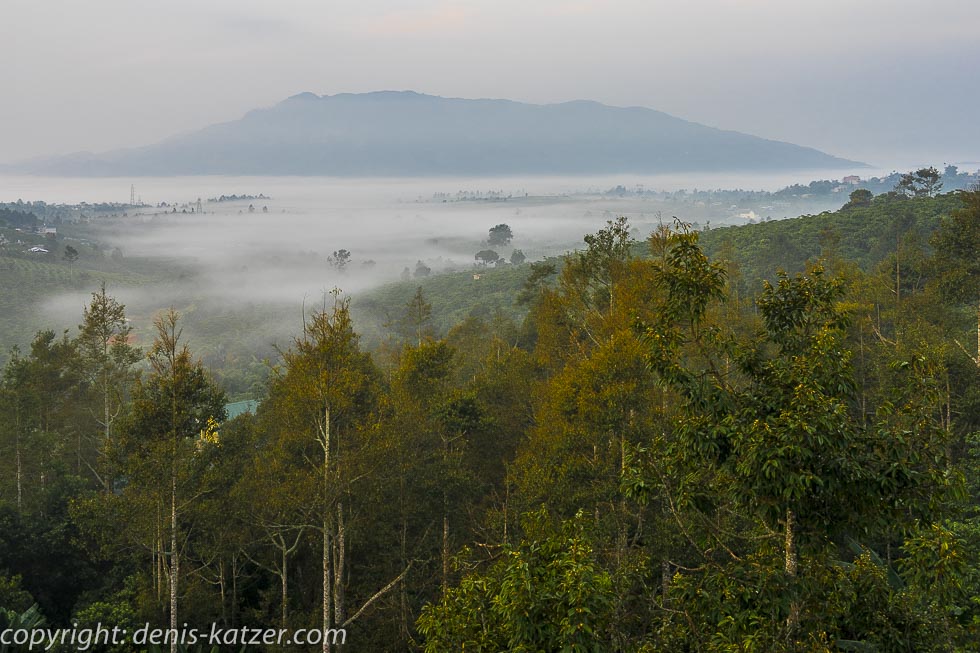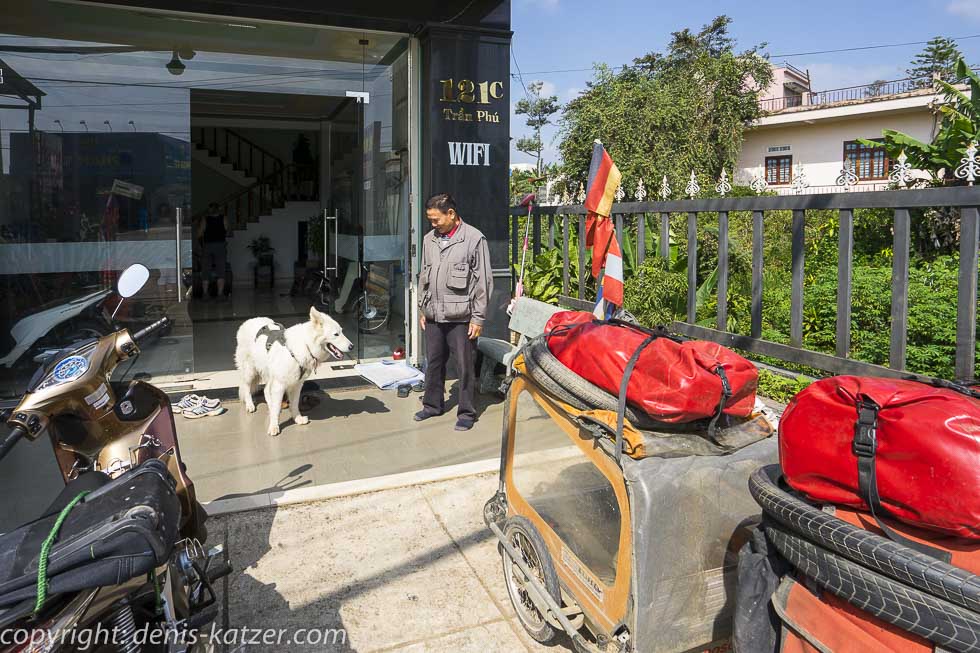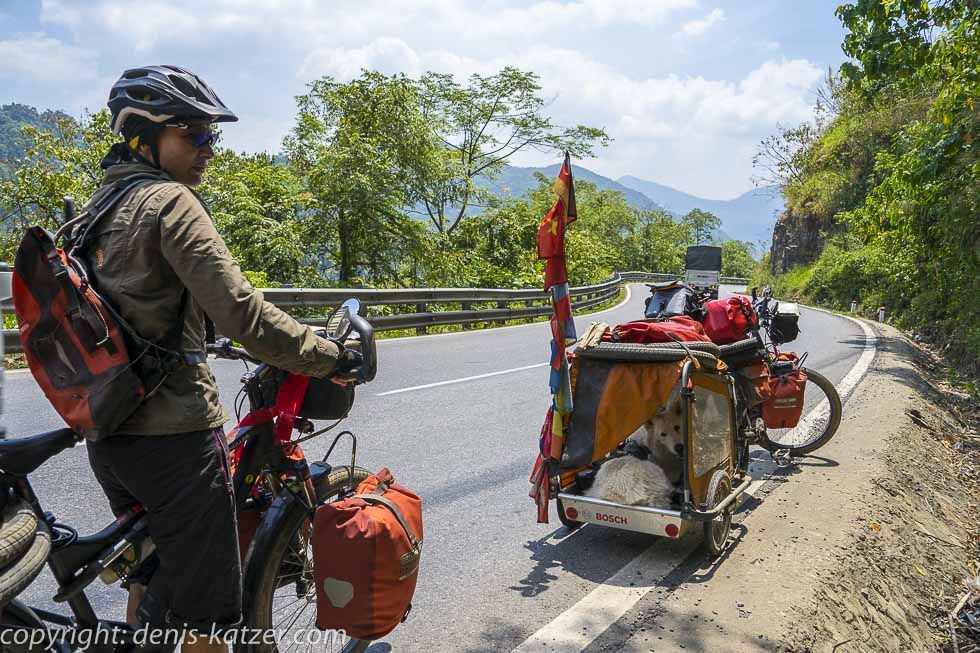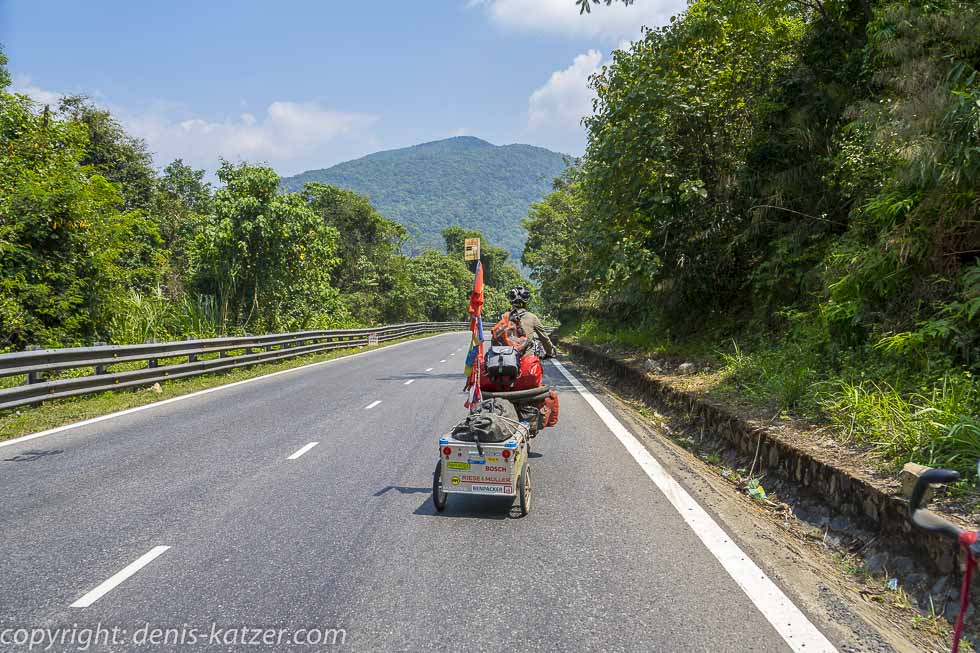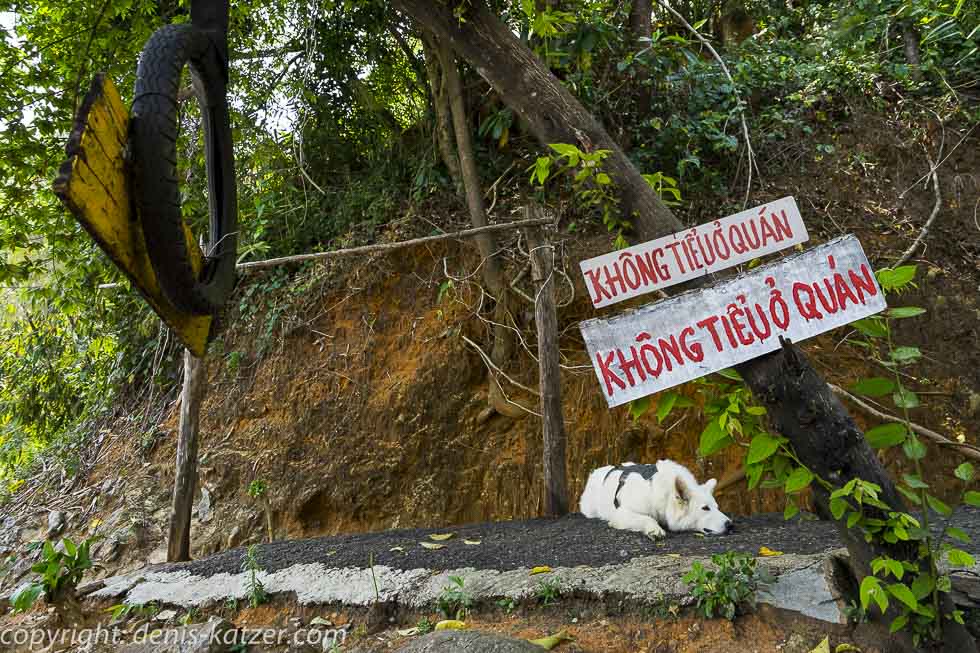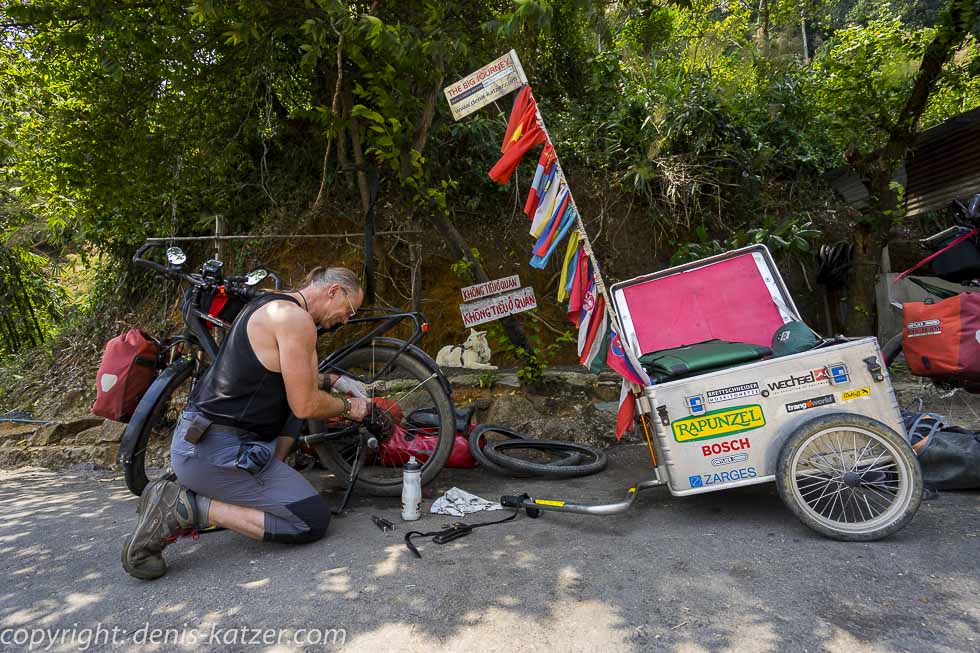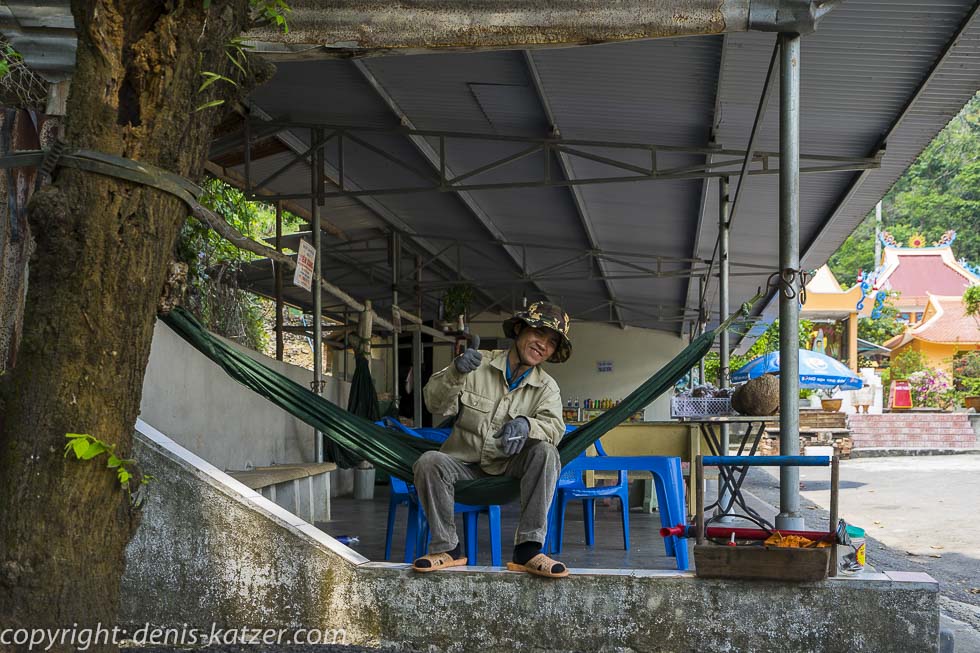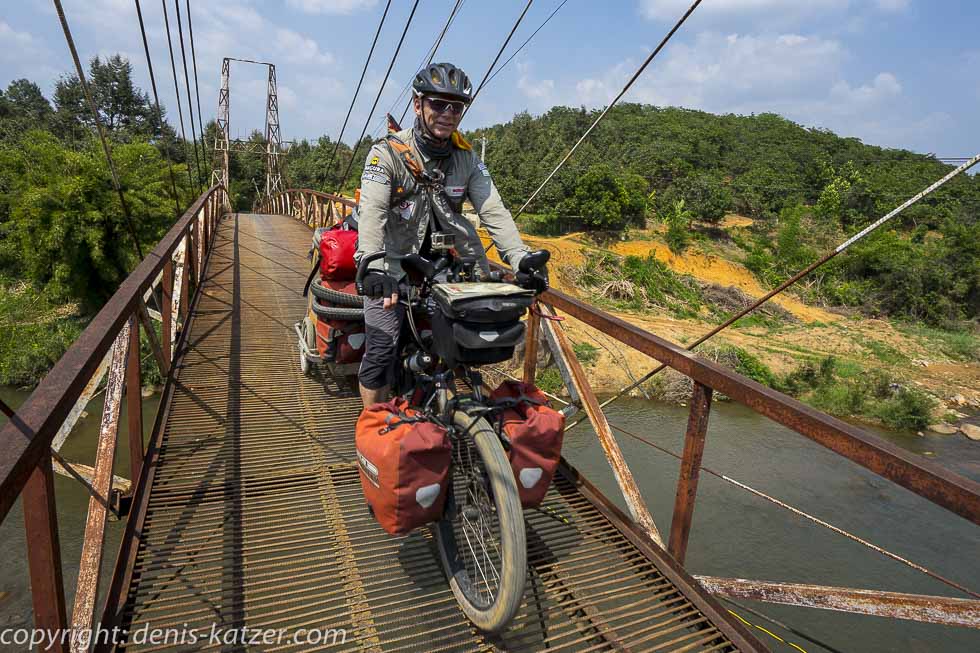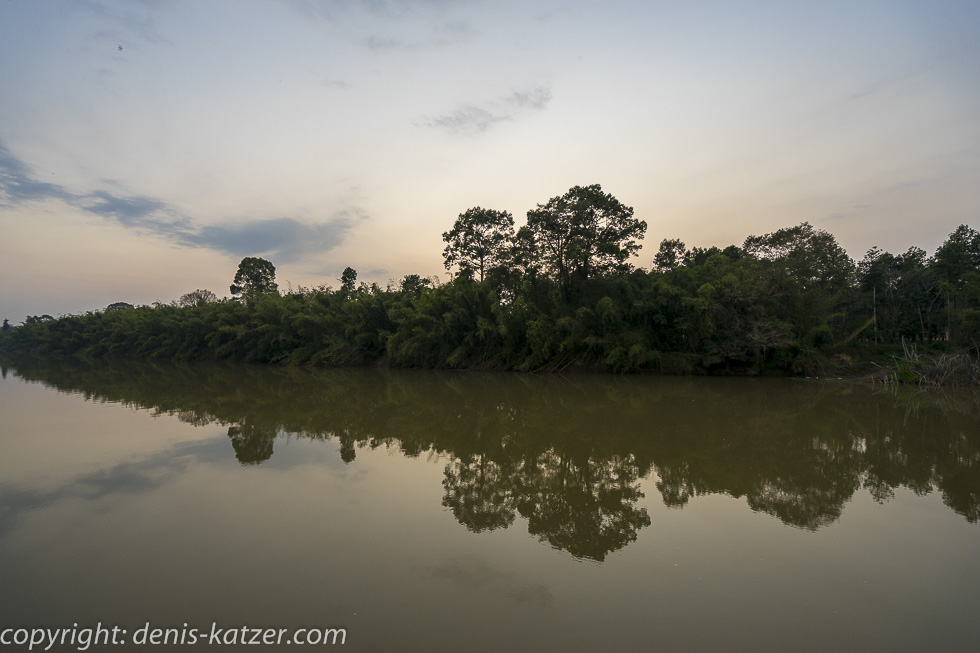
Your dog must have a price, right? – Voltage drop causes unrest
N 11°25'15.9'' E 107°25'49.3''
Date:
10.03.2017
Day: 619
Country:
Vietnam
Province:
Đồng Nai
Location:
Kat Tien National Park
Latitude N:
11°25’15.9”
Longitude E:
107°25’49.3”
Daily kilometers:
70 km
Total kilometers:
22,669 km
As the crow flies:
45 km
Average speed:
24.3 km
Maximum speed:
51.7 km/h
Travel time:
2:43 hrs.
Soil condition:
Asphalt / gravel
Maximum height:
1.000 m
Total altitude meters:
68.623 m
Altitude meters for the day:
288 m
Sunrise:
06:00 a.m.
Sunset:
6:00 pm
Temperature day max:
33°C
Departure:
09:30 a.m.
Arrival time:
5:00 pm
(Photos of the diary entry can be found at the end of the text).
Your dog must have a price, right? – Voltage drop causes unrest
As soon as I get up, I check today’s route again. I notice that I’m driving past Cat Dien National Park. Is it a mistake to leave the famous national park on the right? “Why aren’t we actually visiting the national park?” I ask Tanja, as she is responsible for planning the important sights. “Well, you did say that time was running out.” “Hm, if we want to reach the southern tip of Vietnam in time, it could indeed be tight. But we still have almost three weeks until our visa expires. I think there’s still enough time to visit Cat Tien,” I think. “That’s great. I would love to go there.” “Okay, then we’ll change our plans and cycle into the jungle. We just have to find out if there’s accommodation there and where exactly the entrance to the national park is,” I reply and try to find the details on the map. Once I’ve found the approximate coordinates, I carry the equipment down. Meanwhile, Tanja tries to book a room at a few guesthouses. As today is Friday and many of the accommodations are fully booked due to Vietnamese tourism, this is no easy task.
“How much does your dog cost?” asks the owner of our motel as I load the bikes. “It’s not for sale,” I reply kindly. “I would love to buy it. It must have a price, right?” he persists. “Ajaci has no price. He’s a family member or would you sell your aunt?” I try to make it clear to the older gentleman that he should refrain from making any further offers. After he realizes that he is not making any progress in this matter, he wants to buy one of our Bosch batteries. “The batteries are also not for sale. We need them for our bikes.” “And what about your glasses?” he asks. “I don’t want to sell either,” I reply with a laugh.
I’m just about to click the last bag onto the bike when the man suddenly tries to sit on Ajaci to see if it’s possible to ride our dog. “Nooo!” I shout in horror. The man looks at me, startled. “It’s not a horse,” I try to explain, but I don’t know if the old man has understood me because of the language difficulties. Tanja has finally found a room in a family lodge where Ajaci is also accepted. At 9:30 a.m. we say goodbye to the owner of the small motel and set off for another hot day.
“Denis! I don’t think my rear brake is working properly anymore!” Tanja shouts as we roll down another pass. We stop in the shade of some trees and unload the bike. In fact, the brake pads are completely bare. “Phew, good that you noticed that in time,” I say and check my brake pads to be on the safe side. “A few kilometers further and they’d be off too,” I realize and replace them with new pads as well. Due to the many vertical meters and descents of the last few days, they wore out quickly. Because road dust collects in the brake cylinder, it is not always easy for me to recognize wear in good time. We can’t afford to simply replace the pads as a preventive measure. We don’t have enough supplies for that.
After the current descent, we reach an altitude of just 50 meters above sea level. The heat down here soon becomes unbearable. Although it has already been crispy warm in the last few days, today it is really hot with 33 degrees in the shade. As soon as we stop briefly and the wind is gone, the sweat pours out of our pores. “Will we still be able to manage distances of over 100 km a day with the increasing heat?” I ask Tanja, taking a break in the shade of a tree. “It’s going to be tough. Maybe we’ll just have to shorten the distances.” “It always depends on the accommodation options. But we’ll find a solution. It’s not our first summer on the bike,” I say confidently.
We find the inconspicuous turn-off to road 600 A, which leads us westwards to Cat Dien National Park. “Is that true?” asks Tanja uncertainly, as she can’t imagine that such a narrow, potholed road would lead to one of Vietnam’s most famous national parks. “I don’t know. Seems a bit strange to me too.” “Maybe we should turn back. There was a little cafe at the crossroads. If they have WLAN, we can check the route again on Google Maps or maybe I can call the Bamboo Lodge to confirm the route,” Tanja suggests. “Good idea.”
The information we receive from the Bamboo Lodge is helpful. We should continue along the potholed path and turn north after seven kilometers. It is now 16:00. The hot sun’s rays have lost their aggressiveness. Suddenly a moped rider overtakes us. “Now that’s a sight!” he calls out, pointing at our road trains. “It looks heavy, but it’s still easy to drive,” I reply to the German tourist. “Where are you going?” “To the Bamboo Lodge.” “That’s where we’re staying. Just follow me,” he offers. Minutes later, we reach the lodge with its simple huts in a small, green park. I follow a young, friendly woman who shows me our hut. “Wow,” I exclaim as I enter the bungalow, whose balcony hovers directly over the Dong Nai River. “A fantastic room,” I say to Tanja once I’m back at the bikes. We roll our bikes to our accommodation, unload them and, as always in the last 18 months, carry the equipment to our accommodation. Then we stand on our balcony and look out over the lazily flowing brown jungle river, whose opposite bank is overgrown with dense jungle. Birds chirp loudly as they greet the dawn. “Oh, it’s beautiful here,” I say. UuuuuuuuUUUUUUUUUHHHHHHHH! UuuuuuuuUUUUUUUUUUHHHHHHHH! “Oh, what’s that fascinating singing? Are they birds too?” asks Tanja, as a veritable concert of long, bright notes drifts over to us through the canopy of leaves. “Birds? Hm, I don’t know. Maybe that’s what the gibbons (long-tailed macaques) that are supposed to live in this national park sound like,” I ponder. We stand there spellbound and listen to the beautiful, strange sounds until they stop abruptly. “I’m ravenous. Let’s quickly plug in the batteries and camera batteries, then we can go out for a bite to eat afterwards,” I suggest. As soon as I have plugged our four battery chargers into the socket, the charging lights stop flashing one after the other. “It can’t be. Did they break without a sound?” I ask nervously, pulling the plugs out of the socket only to plug them in again. “I don’t believe that. Our chargers no longer work,” I say, shocked to the core, as we can’t charge the batteries without them and therefore can’t continue driving. “There’s no such thing. There must be other reasons,” Tanja tries to reassure me. “Which one?” I ask, then it occurs to me that our room’s power supply might be overloaded. I immediately switch off all appliances such as the fridge, lights and fan. “Still not working,” I curse. We grab four batteries and the chargers and walk to the simple bamboo restaurant nearby. There I reconnect everything to the power supply. The result is just as devastating as in our room. “We need new chargers. She’s shot something here,” I’m convinced. “I can’t imagine,” Tanja remains confident. “But you can see that the charging lights are dead.” “Wait until tomorrow.” “And you think it will look better tomorrow?” I wonder at Tanja’s naive statement. “Above all, it can take a long time for the chargers to arrive here from Germany. They’re not going to send a courier to the jungle,” I think, wondering how our journey is going to continue. Not giving up, I reconnect the batteries to our room’s power supply. “And?” Tanja is interested. “Dead.” I grab my laptop, write an emergency email to Bosch and ask them to send me new chargers. “Look at this! One of the batteries is flashing. That didn’t work before, did it?” asks Tanja. “No, I couldn’t do that. Everything was dead.” I immediately jump up to look at the awakening battery. “There, the other one is flashing again. And the third and fourth too! The chargers aren’t broken. It must be the power supply here. It’s obviously not delivering enough power. Man oh man, that’s a load off my mind,” I say happily. “Have you sent an email to Bosch yet?” “No.” “Good, then let’s go and get something to eat. I’m ravenous.” “Great idea. I hope they serve cold beer here too. I’m so relieved that I feel like celebrating.”…
If you would like to find out more about our adventures, you can find our books under this link.
The live coverage is supported by the companies Gesat GmbH: www.gesat.com and roda computer GmbH http://roda-computer.com/ The satellite telephone Explorer 300 from Gesat and the rugged notebook Pegasus RP9 from Roda are the pillars of the transmission. Pegasus RP9 from Roda are the pillars of the transmission.
